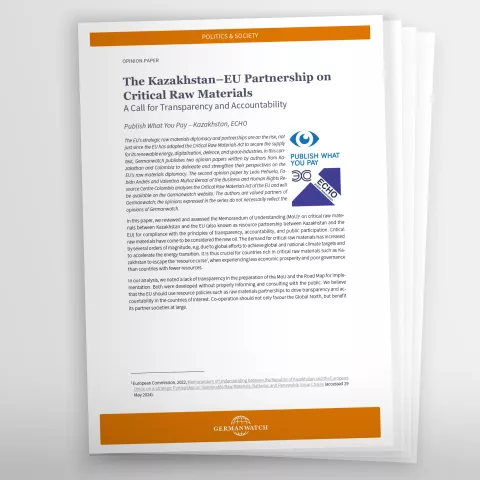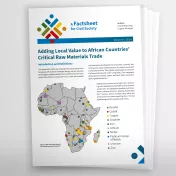
The EU’s strategic raw materials diplomacy and partnerships are on the rise, not just since the EU has adopted the Critical Raw Materials Act to secure the supply for its renewable energy, digitalisation, defence, and space industries. In this context, Germanwatch publishes two opinion papers written by authors from Kazakhstan and Colombia to delineate and strengthen their perspectives on the EU’s raw materials diplomacy. The authors are valued partners of Germanwatch; the opinions expressed in the series do not necessarily reflect the opinions of Germanwatch.
Kazakhstan and the EU have initiated a Critical Raw Materials partnership in 2022. In this opinion paper, the two Kazakhstani transparency experts Mariya Lobacheva and Tatyana Sedova trace how the partneship was set up without properly informing and consulting with the public. They also note a lack of transparency in its implementation. The authors state that transparency, public participation, and oversight is however necessary if co-operation on raw materials should not only benefit the Global North but also the people of Kazakhstan. Furthermore, the impacts of mining and raw materials processing such as negative environmental and social effects need to be addressed. Lobacheva and Sedova therefore conclude that the EU should:
- ensure relevant documents of the partnership will be published in English, Russian, and Kazakh;
- require that future agreements and contracts in the framework of the partnership are discussed with civil society stakeholders and local communities, especially to assess potential threats to the environment;
- limit the confidentiality clause of the Memorandum of Understanding that the partnership is based on to technological aspects as an exception, instead of extending it to the entire agreement;
- ensure that the implementation of projects be transparent and subjected to public monitoring at all stages (implementation reports should be published and updated regularly);
- use available transparency tools, in particular the EITI for better critical raw materials governance.
About the authors:
Mariya Lobacheva is programme director of the Kazakhstani NGO Echo, a member of Publish What You Pay (PWYP). Lobacheva has been working in the non-governmental sector on issues of transparency and accountability in natural resource management for many years. Lobacheva also represents civil society on the Extractive Industries Transparency Initiative (EITI) International Board.
Tatyana Sedova is an expert in extractive industries governance, civic participation, and capacity-building with about 15 years of experience in extractive sector reforms (EITI, the World Bank, PWYP). Tatyana is the founder and director of Transparency Accountability Consulting.
The second opinion paper by León Peñuela, Fabián Andrés, and Valentina Muñoz Bernal of the Business and Human Rights Resource Centre Colombia analyses the Critical Raw Materials Act of the EU and will be available on the Germanwatch website soon.


